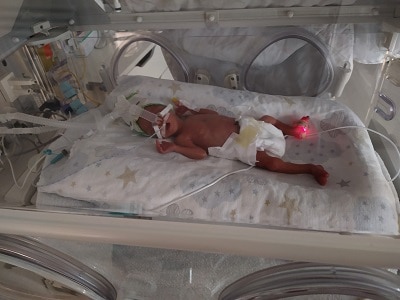For mothers of newborns, the delivery and first weeks are a blend of joy and exhaustion. In the time of COVID-19, there’s extra uncertainty –heightened for second-time mom Hulya when she began to have terrible pain while at home during Turkey’s pandemic lockdown.
It was mid-May and she was in the 28th week of her pregnancy. At first, the on-and-off-again pain was mild. Then, one day she had a pain “that made me cry. But then it passed.” Because of the pandemic and lockdown, she didn’t go see her doctor, she says.
Two days later, however, she suddenly began bleeding and immediately went to the hospital. They quickly delivered her baby by emergency cesarean section. Ozgur was born at 28 weeks and three days, weighing barely 1 kilogram.

Because he was so small and was born so prematurely, and because the hospital where Hulya delivered didn’t have an advanced neonatal intensive care unit (NICU), Ozgur was taken to Selcuk University Faculty of Medicine hospital in Konya, a major city in south-central Turkey.
He was placed in a GE Giraffe OmniBed in the hospital’s 46-bed NICU, where he was monitored and kept warm. A day later, he was intubated to help with his breathing.
Hulya was discharged a day after the delivery, and the very next day was able to see her newborn son. “He was so small. I thought about what would happen and if he could live. I was worried.”
Two days later, she was able to hold him for the first time. “I could really feel that I was his mother when I was holding his warm body against me, even among the breathing tubes and other wires.”
She spent as much time as possible doing “kangaroo care”, the term for holding a baby skin-to-skin. She’s sure that her “contact and love” made a big difference in Ozgur’s development.
That, and other ways she cared for Ozgur, were really important for both mother and child, Hulya says, given that Ozgur had to undergo several surgeries related to complications involving his digestive tract.
More than once these procedures were conducted in the Giraffe OmniBed to maintain the baby’s body temperature. Otherwise, says attending physician Prof. Dr. Hanifi Soylu, “his temperature would have fallen to 31 or 32 degrees,” from the nearly 37 degrees Celsius that is normal.
Hulya advises mothers of preterm babies to spend as much time as possible with their newborns, even while they are in incubators and in the NICU. “Babies need maternal attention. Mothers should talk to their babies and hum melodies. Tiny bodies understand everything!”
By September, Ozgur was home, having tripled in weight to nearly 3 kilograms and spending 60 days in the Giraffe OmniBed and 93 days in the NICU.
Dr. Soylu says that Ozgur’s growth and discharge exemplifies how success in the NICU is built on three legs: the dedication and commitment of the parents, a highly capable and compassionate staff, and advanced technology.
“If any one of them is deficient, the success rate drops by half. If everything combines nicely [as in Ozgur and Huylia’s case] we can achieve ultimate success.”
Read more stories about GE Healthcare’s work to enhance healthcare across the Middle East, North Africa and Turkey.



